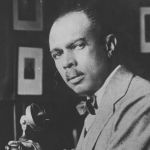Stretch’d and still lies the midnight,
Two great hulls motionless on the breast of the darkness,
Our vessel riddled and slowly sinking, preparations to pass to the one we have conquer’d,
The captain on the quarter-deck coldly giving his orders through a countenance white as a sheet,
Near by the corpse of the child that serv’d in the cabin,
The dead face of an old salt with long white hair and carefully curl’d whiskers,
The flames spite of all that can be done flickering aloft and below,
The husky voices of the two or three officers yet fit for duty,
Formless stacks of bodies and bodies by themselves, dabs of flesh upon the masts and spars,
Cut of cordage, dangle of rigging, slight shock of the soothe of waves,
Black and impassive guns, litter of powder-parcels, strong scent,
A few large stars overhead, silent and mournful shining,
Delicate sniffs of sea-breeze, smells of sedgy grass and fields by the shore, death-messages given in charge to survivors,
The hiss of the surgeon’s knife, the gnawing teeth of his saw,
Wheeze, cluck, swash of falling blood, short wild scream, and long, dull, tapering groan,
These so, these irretrievable.

















Comment form: